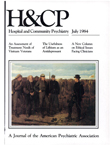The Effects of a Referral Coordinator on Compliance With Psychiatric Discharge Plans
Abstract
To investigate the effectiveness of a referral coordinator on patient compliance with initial aftercare referrals, the authors conducted a three-phase study involving 554 adult psychiatric patients at a Veterans Administration medical center. The first phase of the study established baseline data on compliance; the second phase monitored compliance following staff attempts to provide patients with more assistance in making initial aftercare appointments; and the third phase monitored compliance following the interventions of the referral coordinator. Analysis of the data on patient, hospital, and treatment characteristics indicated a marked increase in aftercare compliance after the addition of the referral coordinator to the treatment team. Compliance was especially increased in the most difficult patient group—the more acutely disturbed, chronic older patients. The authors discuss the implications of the results for discharge planning.
Access content
To read the fulltext, please use one of the options below to sign in or purchase access.- Personal login
- Institutional Login
- Sign in via OpenAthens
- Register for access
-
Please login/register if you wish to pair your device and check access availability.
Not a subscriber?
PsychiatryOnline subscription options offer access to the DSM-5 library, books, journals, CME, and patient resources. This all-in-one virtual library provides psychiatrists and mental health professionals with key resources for diagnosis, treatment, research, and professional development.
Need more help? PsychiatryOnline Customer Service may be reached by emailing [email protected] or by calling 800-368-5777 (in the U.S.) or 703-907-7322 (outside the U.S.).



